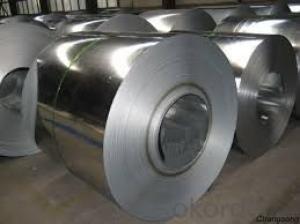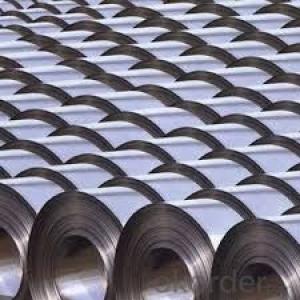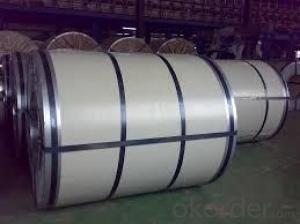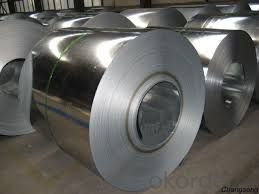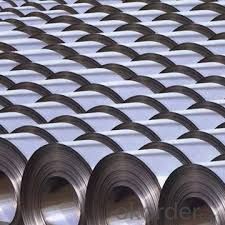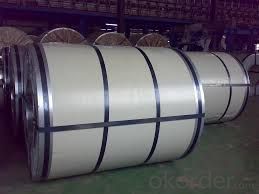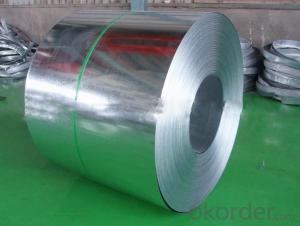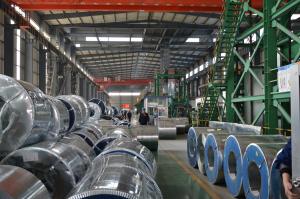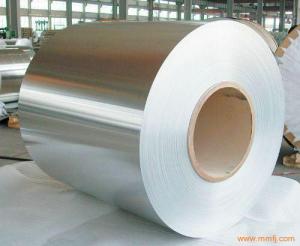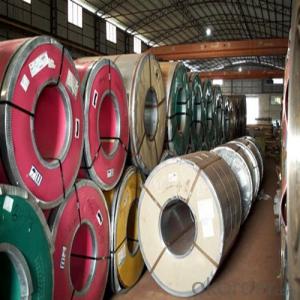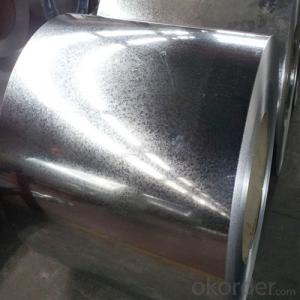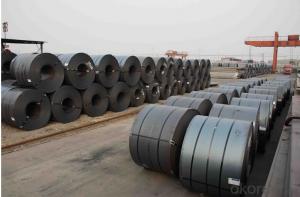hot deep cold rolled/ galvanized steel coil
- Loading Port:
- Shanghai
- Payment Terms:
- TT OR LC
- Min Order Qty:
- 50 m.t.
- Supply Capability:
- 10000 m.t./month
OKorder Service Pledge
OKorder Financial Service
You Might Also Like
Quick Details
| Standard: | AISI,ASTM,BS,DIN,GB,JIS | Grade: | sgcc, a653 | Thickness: | 0.12-6.0,0.19MM-5.0MM |
| Place of Origin: | China (Mainland) | Brand Name: | CNBM | Type: | Steel Coil |
| Technique: | Hot Rolled,cold rolled | Surface Treatment: | zinc coated,color coated or galvanized | Application: | house construction |
| Special Use: | Wear Resistant Steel | Width: | 700 mm -1250 mm,700 mm-1250 mm | material: | sgcc |
| MOQ: | 25 MT | payment term: | T/T , L/C,O/A | delivery time: | 25-40 days |
Packaging & Delivery
| Packaging Detail: | seaworth packing |
| Delivery Detail: | 25-40 days |
Specifications
Z100 hot deep cold rolled dc51d z galvanized steel coil
1) width:914mm,1200mm,1250mm
2) packing:seaworthy packing
Z100 hot deep cold rolled dc51d z galvanized steel coil
THICKNESS 0.135 MM-4.0 MM
WIDTH 600MM-1500MM ,762 MM,914MM,1000 MM, 1200 MM,1219 MM,1250 MM
ZINC COATING 40G-275G
STANDARD ASTM,AISI,DIN, GB
MATERIAL SGCC,DC51D,DX51D,DX520,SGCD,Q195,Q235,SGHC,DX540,S350 GD,S450 GD,S550 GD
SPANGLE ZERO SPANGLE ,REGULAR SPANGLE OR NORMAL SPANGLE
SURFACE TREATMENT CHROMATED AND OILED, CHROMATED AND NON-OILED
PACKING EXPORT STANDARD
PAYMENT T/T,L/C OR DP
MIN ORDER 25 MT
COIL WEIGHT 3-8 MT
QUALITY SOFT OR HARD QUALITY
CNBM INTERNATIONAL
CNBM International Corporation (CNBM International) is the most important trading platform of
CNBM Group Corporation, a state-owned company under the direct supervision of State-owned Assets
Supervision and Administration Commission of the State Council.
As of the end of 2012, CNBM’s total assets exceeded RMB 300 billion, with more than 150,000
employees, and 20 companies under direct management with 100% share control or majority control,
among which 6 were listed companies, including 2 overseas listed. CNBM ranked NO.319 in the Top
Fortune World 500 of 2013 with 34.46 billion dollars revenue.
For now, we have established strategic partnerships with hundreds of domestic manufacturers and
extensive business relations with clients from over 120 countries in the fields of building materials and
equipments by making full use of its absolute superiority in both abundant source and solid technology
support. Currently, we have wholly-owned overseas subsidiaries and branches in 5 countries with a view
to realize localization, which also represents an essential progress in our globalization target.
STEEL SHEET/COIL DEPARTMENT
Our department is specialized in manufacturing and exporting the following products.
HOT ROLLED STEEL
COLD ROLLED STEEL
HOT-DIP GALVANIZED/ALUZINC STEEL
PRE-PAINTED GALVANIZED/ALUZINC STEEL
PRINTING STEEL
We can ensure that stable quality standards are maintained, strictly meeting both market
requirements and customers’ expectations. Our products enjoy an excellent reputation and have been
exported to Europe, South-America, the Middle-East, Southeast-Asia, Africa and Russia etc.. We sincerely
hope to establish good and long-term business relationship with your esteemed company.
COMPANY
PROFILE
- 1 -
- 2 -
Steel Coil/Sheet
CNBM UAE
CNBM INDIA
CNBM GERMANY
CNBM BRAZIL
CNBM K.S.A
CNBM INDONESIA
CNBM THAILAND
CNBM SOUTH AFRICA
- Q: I need to know where to go online to buy a steel cage for a wrestling ring.. Somebody please assist me?
- Steel cages are made from scrap. From either loose metal or loose chains. There might be some on eBay that would be man-made
- Q: What are the different methods of annealing steel coils?
- Steel coils can be annealed using various methods, each with its own advantages and applications. Full annealing, process annealing, and spheroidize annealing are the main methods. The most common method is full annealing, wherein the steel coils are heated above their critical point (usually between 800 and 900 degrees Celsius or 1472 and 1652 degrees Fahrenheit) and then slowly cooled in a controlled manner. This process refines the grain structure of the steel, making it softer and more ductile. Full annealing is employed to relieve internal stresses, enhance machinability, and improve the overall mechanical properties of the steel. Process annealing, sometimes called subcritical annealing or stress relief annealing, is used to reduce the hardness and brittleness of steel coils. It involves heating the coils below their critical point (typically between 550 and 650 degrees Celsius or 1022 and 1202 degrees Fahrenheit) and then slowly cooling them. This method relieves internal stresses that may have developed during previous manufacturing processes like cold working or welding. Process annealing is commonly used to enhance the formability and toughness of steel coils. Spheroidize annealing is a specialized form of annealing that softens high carbon and alloy steels. It entails heating the steel coils slightly below their critical point (usually between 650 and 700 degrees Celsius or 1202 and 1292 degrees Fahrenheit) and holding them at that temperature for an extended period. This allows the carbides within the steel to transform into rounded or spheroidal shapes, thereby increasing machinability and ductility. Spheroidize annealing is frequently employed in the production of cutting tools, bearings, and other applications that require improved machinability. In addition to these main methods, there are variations and specialized techniques like recrystallization annealing, intercritical annealing, and solution annealing. Each method has specific parameters and temperature ranges. The choice of annealing method depends on factors such as the type of steel, desired mechanical properties, and intended application of the steel coils.
- Q: What are the different methods of perforating steel coils?
- There are several methods used for perforating steel coils, each with its own advantages and applications. 1. Mechanical Punching: This is one of the most common methods used for perforating steel coils. It involves using a mechanical press to punch holes in the coil using a punch and die set. The size and shape of the holes can be customized based on the design of the punch and die set. Mechanical punching is efficient and can produce high-quality holes with consistent results. 2. Laser Cutting: Laser cutting is a popular method used for perforating steel coils, especially when complex hole patterns or intricate designs are required. It involves using a high-powered laser beam to cut through the steel coil, creating precise and clean holes. Laser cutting offers flexibility in terms of hole size, shape, and spacing, and it can be computer-controlled for precise and repeatable results. 3. CNC Plasma Cutting: This method involves using a high-velocity plasma jet to cut through the steel coil and create perforations. CNC (Computer Numerical Control) technology is used to guide the plasma cutter, enabling precise and accurate hole patterns. CNC plasma cutting is ideal for thicker steel coils and can produce larger holes compared to laser cutting. 4. Waterjet Cutting: Waterjet cutting uses a high-pressure jet of water mixed with an abrasive material to cut through the steel coil. This method offers versatility in terms of hole size, shape, and material compatibility. Waterjet cutting is known for its ability to produce intricate and precise perforations without heat-affected zones or distortion. 5. Electrical Discharge Machining (EDM): EDM is a method that utilizes electrical discharges to erode the material and create perforations in the steel coil. It involves using a conductive electrode and a dielectric fluid to generate controlled sparks that remove material and form holes. EDM can be used to create complex shapes and patterns and is particularly suitable for hard materials. The choice of method depends on factors such as the desired hole size and shape, the thickness and type of the steel coil, the required precision, and the production volume. Each method has its own advantages and limitations, and it is important to select the most appropriate method based on the specific requirements of the perforated steel coils.
- Q: How long do steel coils last?
- The lifespan of steel coils can vary depending on various factors such as the quality of the steel, the conditions in which they are stored or used, and the specific application for which they are being used. Generally, high-quality steel coils can last for several years to several decades before showing signs of deterioration or wear. However, it is important to note that steel coils can be susceptible to corrosion if not properly maintained or protected from moisture or harsh environmental conditions. Therefore, regular inspection, maintenance, and appropriate storage or usage practices are crucial in maximizing the lifespan of steel coils.
- Q: Okay, I have looked all ovcer the net and it says diamonds are stronger, but why? I mean, why is diamonds used for the top equiptment rather than steel?
- diamonds are not so much 'stronger' but they are harder than steel. they are harder because of the symmetry of their crystalline structure. Steel can be made harder by helping it's crystalline structure become more symmetrical, but it's not going to have the perfect structure that diamonds do....it's just impossible due to the chemistry of steel. Many industrial drill bits or abrasives use tiny diamonds for the cutting edge, because they are harder and therefore can withstand more abuse before eroding away. coring bedrock is one common application. However, diamonds do have their weaknesses, and by the right person they can be cut along planes with relative ease. diamonds are not malleable or ductile, so making equipment out of them is just not in the cards, not to mention how much money it would cost to do so....and you can't weld diamonds together to make a long piece of diamond, what you get out of the earth is what you get....or they can make diamonds, but still, we can't create diamonds that are multiple feet long!!
- Q: My string on my acoustic guitar broke. Can I replace all of my strings with phosphor bronze guitar strings if my guitar has steel strings on them?
- Yes you can. In fact, I prefer phosphor bronze strings to standard steel on my acoustic guitar. I think they play better, feel better, and sound better. My favorites are the D'Addario phosphor-bronze medium gauge.
- Q: I feel really stupid asking this question but i feel like a put metal/steel strings on my classical guitar how do you tell the difference?
- you do NOT want to put steel strings on a nylon string guitar, it will ruin it. It does get a little confusing. With steel strings, all 6 strings are metal. (usually steel, but not always, nickel, copper may be used too) And they use a steel core. with nylon strings, the high 3 strings, are obviously nylon/plastic. the 3 bass strings look metal, but they have a silk type core, with metal wrapped around it. The steel strings have a LOT more tension,, they can break the plastic tuners, beak the nut, pull the top up, and pull the bridge off, If you're not sure yet, have a real music store explain it, not a toy store, or costco or walmart.
- Q: How are steel coils processed into finished products?
- Steel coils are processed into finished products through a series of steps, including flattening, cutting, shaping, and treating. First, the coils are unrolled and flattened to obtain a flat sheet. Then, they are cut into desired lengths and shapes using various cutting techniques. Next, the sheets are shaped into specific forms using methods like bending, rolling, or stamping. Finally, the finished products undergo treatments such as heat treatment, galvanization, or coating to enhance their durability and appearance.
- Q: How are steel coils used in the manufacturing of marine equipment?
- Steel coils are used in the manufacturing of marine equipment as they serve as a primary material for constructing various components such as hulls, decks, and superstructures. The coils are shaped, cut, and formed into the desired shapes and sizes to create strong and durable structures that can withstand the harsh conditions of the marine environment. Additionally, steel coils are also used in the fabrication of marine machinery and equipment, including engines, propellers, and winches, due to their high strength and corrosion resistance properties.
- Q: I want to know where cold formed steel framing is used, is every steel frame we see in a construction sites like houses, building and bridges cold formed steel frames? or hot formed steel framing?I also read that cold formed steel framing is used for floors, is the steel frame beneath the floor's concrete cover?Thank u very much!!
- It will vary from location to location. A possible way of telling is how the material is joined. If the material is riveted together it is likely cold rolled. If the material is welded then its probably normalized steel (possibly annealed but less likely). Cold rolling increases the yield strength of the material so less of it is needed. However, it also make the material more brittle. Welding creates defects in the region surrounding the weld and these are more likely to grow and cause failure in a cold rolled steel than a normalised or annealed steels. In addition the heat from the welding will change the microstructure that was deliberately introduced by the cold rolling process resulting in a localised drop in yield strength. Normalised and annealed steels are more ductile and tougher than Cold rolled steel but they have a lower yield strength. Because they are tough and ductile they are less sensitive to crakcs and defects so welding won't lead to as big a reduction in strength. Another possible consideration is the environment they are used in. Steels exhibit a transition temperature (actually more like a range) where they go from behaving like a ductile material to a brittle material. A well known example of what this can cause are the Liberty ships in WW2 (Supply vessels from the US to the UK). These were made by welding together sheets of cold rolled steel to form one continuous Hull. Unfortuantely the transiton temperature of the steel taht was sued was around 4 degrees while the Baltic Ocean is about 0 degrees. As a result small cracks would grow and then when the reached a critical size they would tear through the ship at the speed of sound in the metal (1500m/s) and these massive cargo ships would literally snap like twigs. So, if the steel is being used somewhere really cold its unlikely to be Cold rolled too.
Send your message to us
hot deep cold rolled/ galvanized steel coil
- Loading Port:
- Shanghai
- Payment Terms:
- TT OR LC
- Min Order Qty:
- 50 m.t.
- Supply Capability:
- 10000 m.t./month
OKorder Service Pledge
OKorder Financial Service
Similar products
Hot products
Hot Searches
Related keywords
